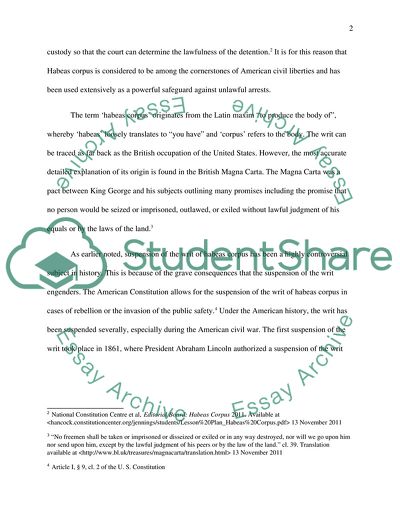Cite this document
(Was the Suspension of Habeas Corpus by Jefferson Davis Necessary Research Paper Example | Topics and Well Written Essays - 2500 words - 1, n.d.)
Was the Suspension of Habeas Corpus by Jefferson Davis Necessary Research Paper Example | Topics and Well Written Essays - 2500 words - 1. https://studentshare.org/history/1760858-was-the-suspension-of-habeas-corpus-by-jefferson-davis-necessary
Was the Suspension of Habeas Corpus by Jefferson Davis Necessary Research Paper Example | Topics and Well Written Essays - 2500 words - 1. https://studentshare.org/history/1760858-was-the-suspension-of-habeas-corpus-by-jefferson-davis-necessary
(Was the Suspension of Habeas Corpus by Jefferson Davis Necessary Research Paper Example | Topics and Well Written Essays - 2500 Words - 1)
Was the Suspension of Habeas Corpus by Jefferson Davis Necessary Research Paper Example | Topics and Well Written Essays - 2500 Words - 1. https://studentshare.org/history/1760858-was-the-suspension-of-habeas-corpus-by-jefferson-davis-necessary.
Was the Suspension of Habeas Corpus by Jefferson Davis Necessary Research Paper Example | Topics and Well Written Essays - 2500 Words - 1. https://studentshare.org/history/1760858-was-the-suspension-of-habeas-corpus-by-jefferson-davis-necessary.
“Was the Suspension of Habeas Corpus by Jefferson Davis Necessary Research Paper Example | Topics and Well Written Essays - 2500 Words - 1”. https://studentshare.org/history/1760858-was-the-suspension-of-habeas-corpus-by-jefferson-davis-necessary.


